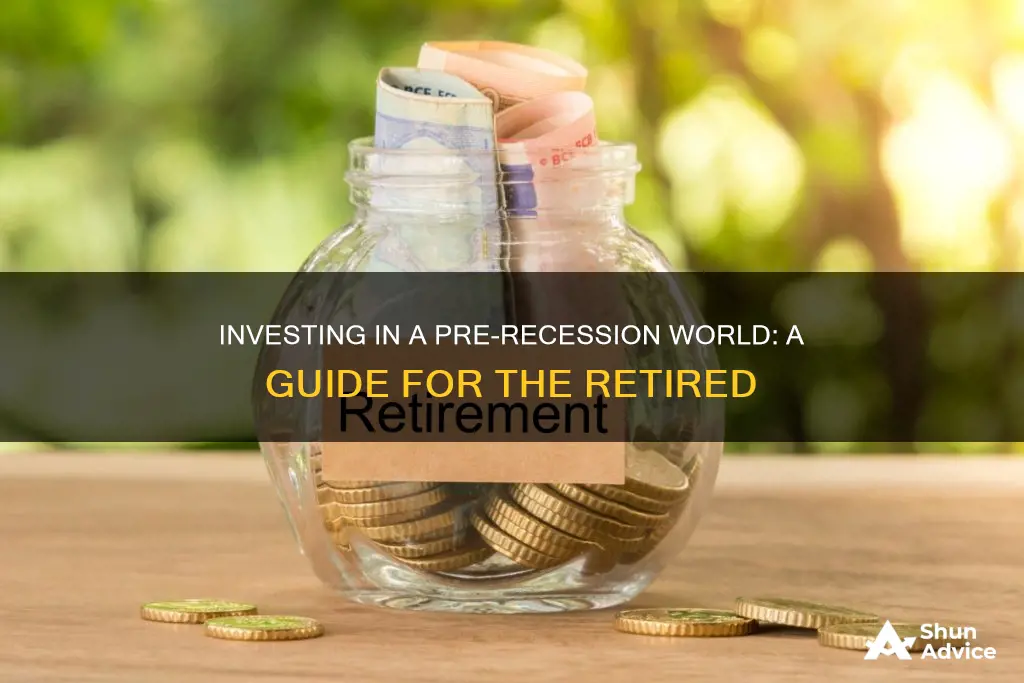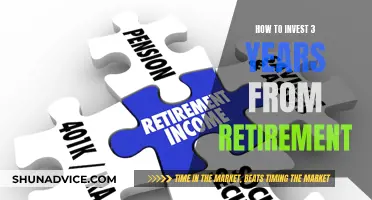
Retiring during a recession can be a daunting prospect, but there are several strategies that can help shield retirees' portfolios from long-term fallout. It's important to remember that recessions are temporary, and history has shown that those who invest during a recession can reap big returns over the following years. Here are some key considerations for retired people when it comes to investing pre-recession:
1. Save and build an emergency fund: It's crucial to have enough savings to cover living expenses for at least six months. This will provide a financial cushion during uncertain times.
2. Pay down debt: Reducing debt is equivalent to earning a higher interest rate on savings. It's a good idea to focus on paying off high-interest credit card debt first.
3. Keep a cash stash: Retirees should consider keeping a year's worth of expenses in cash within their retirement account. This will help them avoid selling stocks during a market downturn, allowing their other investments time to recover.
4. Stay safe with low-risk investments: While cash options may offer low interest rates, they can still provide a better return than a declining stock market. Money market mutual funds, for example, offer a relatively safe option.
5. Diversify your portfolio: Diversification is a key strategy to reduce investment risk. This means spreading investments across different asset classes, industries, geographic locations, and company sizes.
6. Consider a part-time job: Working part-time can supplement retirement income, reducing the need to withdraw from retirement accounts. This gives the portfolio time to recover and can also delay the need to claim Social Security benefits, resulting in larger monthly checks.
7. Invest in index funds: Index funds, particularly those tracking broad indexes like the S&P 500, offer a way to bet on the long-term success of U.S. businesses. They provide diversification and have historically performed well over time.
8. Dollar-cost averaging: Instead of trying to time the market, consider investing incrementally. This strategy involves investing equal dollar amounts at regular intervals, allowing investors to take advantage of market dips and automatically buy more shares when prices are low.
9. Avoid speculation and day trading: Recessions are not the time to speculate on beaten-down stocks or try your hand at day trading. Focus on investing in high-quality companies with strong balance sheets and good long-term prospects.
10. Long-term perspective: Investing during a recession requires a long-term perspective. Don't obsessively check your portfolio, as this can lead to panic selling. Plan to leave your investments alone for at least seven years to ride out the market volatility.
| Characteristics | Values |
|---|---|
| Savings | Aim to have 3-6 months' worth of living expenses saved in an emergency fund |
| Debt | Pay down debt to save money on interest |
| Cash | Keep a cash stash of around a year's worth of expenses in your retirement account |
| Investments | Stay invested, but don't obsessively check your portfolio |
| Portfolio | Diversify your portfolio, and consider investing in index funds |
| Part-time work | Taking on a part-time job can reduce withdrawals from your retirement accounts |
| Annuity | An annuity can create a steady stream of income |
| Social Security | Postpone claiming Social Security benefits to increase monthly checks |
What You'll Learn

Save an emergency fund to cover 3-6 months' living expenses
It's important to have an emergency fund to cover 3-6 months' worth of living expenses. This is a general rule of thumb, but it's a good starting point for retirees or those about to retire. This fund can be used to cover unexpected costs such as car repairs, medical emergencies, or job losses.
The exact amount you should save depends on your individual income and comfort level. If you are making 25% less than before, for example, aim to save 25% less. Or, if you can only afford to put away $25 per paycheck, then that's a good starting point.
- Make a budget: Figure out your monthly expenses and then multiply this number by three or six to get your savings goal. This will give you an idea of how much you need to save.
- Cut down on expenses: Buy generic brands, meal plan, skip eating out, join a grocery rewards program, and cut down on streaming services. All of these things can help you save more money each month.
- Increase your income: Consider getting a side hustle, picking up freelance work, or selling items you no longer need.
- Automate your savings: Set up automatic transfers from your paycheck into your savings account. This way, you won't be tempted to spend the money elsewhere.
Remember, it's okay if you need to use the funds for emergencies before you reach your goal. You can always rebuild your emergency fund, and the most important thing is that you have some savings to fall back on when you need it.
Seeking Investors for Your Farm?
You may want to see also

Pay off debt to save money on interest
Paying off debt is a great way for retired people to save money on interest. Here are some tips to help retired people pay off their debt before a recession:
Understand your financial situation
First, you need to understand your financial situation. Review your monthly income, household expenses, and any existing savings. Make a list of all your debts, including creditor names, balances, interest rates, and payment due dates. This will help you prioritize which debts to pay off first and determine how much you can allocate towards debt repayment each month.
Focus on high-interest debt
Prioritize paying off debts with high-interest rates first. Credit card debt, for example, typically carries a much higher interest rate than what you would earn on a savings account. By paying off credit card debt, you can save a significant amount of money on interest.
Make more than the minimum payment
If possible, pay more than the minimum amount required on your credit card debt. This will help you reduce the total interest you pay and shorten the time it takes to eliminate the debt. Even a few extra dollars each month can make a difference.
Create a budget and cut unnecessary expenses
Formulate a budget by calculating your monthly income and expenses. From there, identify areas where you can cut back on spending. For example, you may be able to save on groceries by buying raw ingredients instead of prepackaged meals or taking advantage of loyalty programs at the grocery store. You can also consider cancelling any unused subscriptions or memberships.
Build an emergency fund
While focusing on debt repayment, it's important to have an emergency fund to cover unexpected expenses. Aim to save at least three to six months' worth of expenses in a high-yield savings account. This will help you avoid taking on more high-interest debt in the event of a financial emergency.
Consider debt consolidation
If you have multiple high-interest debts, you may benefit from debt consolidation. This involves taking out a single loan to pay off all your existing debts, potentially qualifying you for a lower interest rate. It also simplifies your debt repayment by combining multiple payments into one.
By following these steps, retired individuals can effectively pay off their debt and save money on interest, which will help them prepare for an upcoming recession.
Why Investing in Us Remains Profitable Despite No Dividends
You may want to see also

Keep a cash stash to avoid selling stocks at a loss
Retirees should keep a cash stash to avoid selling stocks at a loss. This is because bear markets in stocks typically last about a year, and you don't want to sell stocks when the market is falling. If your investments are down 10% and you withdraw 5%, your account is down 15%.
It is recommended that retirees who are taking withdrawals from their savings keep about a year's worth of expenses in cash in their retirement account. This allows them to avoid selling stocks during a market downturn and gives their other, riskier investments time to recover. While cash options may not offer high interest rates, they are still a better option than losing 20-30% from stocks in a bear market.
Additionally, retirees should be prepared for the possibility of a recession by saving an emergency fund, paying off debt, and staying diversified across different forms of investments, industries, geographic locations, and companies of various sizes. It is also important to remember that staying invested through a recession is often the best response, as historically, investors who hold on to their investments see their portfolios recover.
In terms of specific investments, utilities and consumer staples index funds or exchange-traded funds can add stability to a portfolio during uncertain economic times. These sectors tend to be less risky because they provide essential goods and services that people are unlikely to forgo during a recession.
Overall, keeping a cash stash and following these other tips can help retirees avoid selling stocks at a loss and protect their financial well-being during a recession.
Monthly Cash Flow: Exploring Regular Investment Payouts
You may want to see also

Diversify your portfolio to reduce risk
Diversification is a common investment strategy that can help retired people protect their wealth and reduce their risk of loss. By spreading investments across different asset classes, industries, and geographic regions, retirees can lower the volatility of their portfolio and protect their capital.
Diversify Across Asset Classes
One of the most common ways to diversify is to spread your investments across different asset classes, such as stocks, bonds, cash or cash equivalents, real estate, commodities, and alternative investments. By blending dissimilar assets, you can reduce your exposure to any one individual asset class or market sector. For example, stocks offer high long-term gains but are volatile, especially in a cooling economy. On the other hand, bonds are income generators with modest returns and usually perform weaker during an economic expansion.
Diversify Within Asset Classes
You can further diversify by breaking down these asset classes into subcategories. For instance, when investing in stocks, you can diversify by industry, company size, and geography. Some sectors are considered cyclical, with their performance closely tied to the economic cycle, while others are defensive and less impacted by economic fluctuations. Larger companies also tend to be more stable and better able to weather economic downturns.
Similarly, when investing in bonds, you can diversify by creditworthiness or safety, issuer, and term. Bonds with higher creditworthiness, such as U.S. Treasuries, offer lower returns but are safer investments. Longer-term bonds, on the other hand, offer higher returns but are subject to more interest rate risk.
Diversify Geographically
Investing in companies and assets outside of your home country can also add diversification to your portfolio. International markets can include both developed markets, which tend to be more stable, and emerging markets, which offer higher growth potential but come with greater risk.
Diversify Across Time Frames
When considering investments, think about the time frame in which they operate. Longer-term investments, such as long-term bonds, often have higher inherent risk but also offer higher potential returns. In contrast, short-term investments are more liquid and yield lower returns.
Use Index Funds and ETFs
Exchange-traded funds (ETFs), index funds, and mutual funds are simple and low-cost ways to achieve diversification. These funds typically hold a variety of individual stocks, bonds, and other assets, allowing you to own a diverse range of companies and industries within a single investment. They are also passively managed, resulting in lower fees than actively managed funds.
Diversify Your Investment Accounts
In addition to diversifying your investments, it's important to diversify your investment account types. Different types of accounts, such as workplace retirement accounts, individual retirement accounts (IRAs), health savings accounts (HSAs), and taxable brokerage accounts, offer varied tax benefits. By strategically allocating your investments across these accounts, you can minimize your tax burden.
Investments: Where People Put Their Money
You may want to see also

Invest in stocks of top-notch businesses at a favourable price
Investing in stocks during a recession can be a good idea, but only if you have the financial capacity to do so and the right attitude and approach. Here are some tips for investing in stocks of top-notch businesses at a favourable price during a pre-recession period:
- Focus on top-quality, defensive companies with strong balance sheets: During a recession, it's crucial to focus on investing in high-quality companies with strong fundamentals. Look for businesses with strong balance sheets, healthy cash flows, and a long track record of weathering economic downturns. These companies tend to be more resilient during tough economic times.
- Prioritize large, stable companies: Generally, larger companies are more stable than smaller ones during a recession. They often have larger cash reserves, established brand names, and a history of stable operations. As a result, they may be better equipped to withstand short-term economic disruptions.
- Consider consumer staples and utilities: During a recession, people may cut back on discretionary spending, but they will still need essential goods and services. Consider investing in companies that provide consumer staples (e.g., food, beverages, household goods) and utilities (e.g., electricity, water). These sectors tend to be more defensive and less sensitive to economic cycles.
- Look for favourable prices: A recession can create opportunities to buy stocks at favourable prices. Keep an eye on the market and set price thresholds for the stocks you're interested in. Be prepared to buy when prices reach those thresholds, but remember that timing the market perfectly is nearly impossible.
- Take a long-term approach: Investing during a recession requires patience and a long-term perspective. Plan to hold your investments for the long term, as it may take time for their value to recover and grow. Avoid obsessively checking your portfolio, as this can lead to panic selling.
- Diversify your portfolio: Diversification is always important, but it can be especially protective during a recession. Spread your investments across different industries, sectors, company sizes, and geographic locations. This helps reduce the impact of any single investment or market segment on your overall portfolio.
- Maintain an emergency fund: Ensure you have sufficient emergency savings before investing during a recession. Aim to have enough money set aside to cover your living expenses for at least three to six months. This will provide a financial cushion if you face any unexpected expenses or losses.
Remember that investing during a pre-recession period carries risks, and there are no guarantees. Always assess your financial situation, risk tolerance, and investment goals before making any investment decisions.
Investment Firms: Your Retirement's Best Friend
You may want to see also
Frequently asked questions
A recession is a period of declining GDP, generally defined as a sustained decline for two or more consecutive quarters. During a recession, stock values often decline, and there may be widespread job losses and fewer available jobs. It's important to remember that recessions are temporary, and the best response is usually to stay invested and take a long-term approach.
No, it's generally not a good idea to make big changes to your portfolio during a recession. Instead, try to stick with your long-term financial plan and stay invested if you can. Recessions can be a good time to buy stocks of top-notch businesses at favourable prices, but only if you have a strong financial position and the right attitude.
Ensure you have enough emergency savings to cover living expenses for at least three to six months. Consider investing in lower-risk assets, such as utilities or consumer staples, and avoid speculative investments. If possible, avoid touching your portfolio for at least seven years to give it time to recover.
Yes, working part-time or taking on freelance work during a recession can provide several benefits. It can reduce the need to withdraw from your retirement accounts, giving them time to recover, and it can also postpone the need to claim Social Security benefits, resulting in larger monthly checks when you do start receiving them.
It's important to have a solid investment strategy that aligns with your personal beliefs and is backed by academic research. This will help you make rational investment decisions and keep your emotions in check during volatile markets. Additionally, look for ways to optimise your current financial situation, such as by building an emergency fund or paying down debt.







